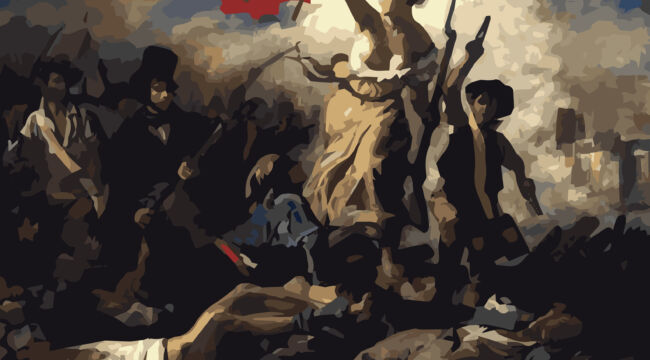The Original Leftists
Happy Thursday!
Tomorrow is Bastille Day. And with all the recent trouble in France, it’s interesting to revisit the beginning of communism. They’re not communists there, you say? Perhaps not. But one bright historian called the French Revolution the “Proto-Communist Revolution.”
Didn’t Marx and Engels start it all? Nope. They just wrote those stupid ideas down.
But thanks to this historian of fantastic ability and insight, we know that the French Revolution was nothing like the American Revolution: it was the beginning of the downfall of The West.
Paris 2000
I stood at the top of the Eiffel Tower, marveling at the French fighter jets flying over the path of the Champs Elysees.
It was July 14, 2000, and I had no idea I had booked my vacation on their holiday. Moreover, I didn’t realize it until I somehow managed to ascend to the top of the Eiffel Tower.
I didn’t mail my mother flowers that year, so I thought a call would suffice.
I grabbed my Nokia and dialed New Joisey, where my parents still lived. My mother answered the phone.
“Happy Birthday, Mom!”
“Thanks, Seanie!”
We chatted and then I told her where I was. She heard the jet engines scream overhead. It was a nice moment. (Mom’s not much of a traveler, so she didn’t mind not being there.)
I thought it a crazy coincidence that my mother’s birthday fell on Bastille Day.
It wasn’t until I read about Erik von Kuehnelt-Leddihn that I thought it unfortunate.
“The World’s Most Fascinating Man”
You must be something special for an intellect like William F. Buckley to call you that. Buckley also called him “A Walking Book of Knowledge.”
Kuehnelt-Leddihn had an encyclopedic knowledge of the humanities and was a polyglot. He was able to speak eight languages and read eleven others.
Kuehnelt-Leddihn argued that majority rule in democracies is a threat to individual liberties. He declared himself a monarchist and an enemy of all forms of totalitarianism. However, he also supported what he defined as “non-democratic republics,” such as Switzerland and the early United States.
He was unabashedly Catholic and Conservative. Moving to America after World War I, he taught at Georgetown University, Saint Peter’s College, Fordham University, and Chestnut Hill College. Kuehnelt-Leddihn resettled in his native Austria in 1947 and devoted his time to alternating periods of studying, traveling, writing, and lecturing.
He was a columnist for the National Review for 35 years.
What he says about the French Revolution is shocking and refreshing.
But First, The Original Leftists
The first Leftists were a group of newly elected representatives to the National Constituent Assembly at the beginning of the French Revolution in 1789. They were called “Leftists” simply because they sat on the left side of the French Assembly.
Shockingly, the original Leftists wanted to abolish government controls over industry, trade, and the professions. They wanted wages, prices, and profits to be determined by competition in a free market. They stood for freeing their economy from central planning.
Perhaps most surprisingly, they wanted to remove the government-guaranteed special privileges of guilds, unions, and associations whose members could set the price of their product above what it would be in a free market.
Funnily enough, the Rightists wanted a highly centralized national government, special laws and privileges for unions and various other groups and classes, government-run economic monopolies in various necessities of life, and government controls over prices, production, and distribution.
You know, like most of today’s Republicans. (Ouch…)
The Leftists held power for two years with a small majority. To their great credit, they pushed most of their program through. But before they completed it, a violent minority from their own ranks — the revolutionary Jacobins — took over.
Head Jacobin and downright evil bastard Maximilien Robespierre, the “spokesman for the people,” first said that the division of the powers of government was a good thing when it diminished the king’s authority. But when Robespierre became the leader, that power belonged to the people, and he chose to consolidate it… predictably.
And so began the Reign of Terror.
This is what led Kuehnelt-Leddihn to write:
First of all, one has to bear in mind that 1789 did not lead necessarily and inevitably to 1792 and to the rise of totalitarianism in Europe and later in all other quarters of the globe.
Later Lord Acton, Alexis de Tocqueville, Philippe Sagnac, Georg Jellinek, and Felix have emphasized the American roots of the French Revolution but also insisted that the ideas prevailing in America at the time of the War of Independence had been grossly misinterpreted by the French: They assumed a new meaning and, when transplanted in French soil, degenerated rapidly.
Many Americans, fresh from creating their own country, were horrified by what happened in France. John Adams was chief among them. In a letter, he wrote to Benjamin Rush in 1811:
Have I not been employed in mischief all my days? Did not the American Revolution produce all the calamities and desolation to the human race and the whole globe ever since? I meant well, however. My conscience was clear as a crystal glass, without scruple or doubt. I was borne by an irresistible sense of duty. God prospered our labors, and, awful, dreadful, and deplorable as the consequences have been, I cannot but hope that the ultimate good of the world, of the human race, and of our beloved country, is intended and will be accomplished by it.
And for those who still cannot understand why “democracy” has no mention in the US Constitution, Adams wrote, “Napoleon and all his generals were but creatures of democracy.”
Kuehnelt-Leddihn included these gems in his chapter on the French Revolution in his fabulous book Leftism.
Needless to say, children should belong to the state, a demand that will always be raised by leftists who have an innate hatred for the family as an “individualistic” group that tries to separate itself as an independent cell within the state and society.
Voltaire was certainly not an ardent republican, nor was he a democrat. His ideal was a constitutional monarchy headed by a roi sage, Plato’s philosopher-king. So was Diderot’s.
Voltaire wrote of the republic that it represented a social order leading to tyranny. “Independent of my love for freedom,” he wrote, “I still would prefer to live under a lion’s paw than under the teeth of a thousand rats who are my fellow citizens.”
It’s fascinating that the French celebrate this day, even though the Bastille was already condemned and ready to be sold by the government for a real estate project.
Hilariously, when the “storming” actually happened, Kuehnelt-Leddihn writes:
The Governor of the Bastille, M. de Launay, an enlightened liberal, had a tiny garrison of Swiss and some invalid veterans at his disposal when the mob finally gathered around the building on July 14: He offered only token resistance. The delegates of the Town Hall and two appointees of the mob were received and were invited to join the governor at his meals. In the meantime the drawbridge of the outer court was let down and guns were directed at the inner court. The soldiers, sensing that they had no commander willing to take the responsibility, surrendered.
The surprise came when the “victors” found only seven prisoners. Four were forgers who quickly decamped, two were insane (they had been there only for observation), and one was a dissolute young man of noble descent who considered himself the real hero of the day: he harangued the people with revolutionary phrases.
Much ado about nothing, methinks.
The French Revolution was the template, not for freedom reigning, but for totalitarian revolutions worldwide. It was a genuine disaster, which led Kuehnelt-Leddihn to write:
For the average person, all problems date to World War II; for the more informed, to World War I; for the genuine historian, to the French Revolution.
Keep that in mind when someone tries to compare July 4th to July 14th. They’re clearly misinformed.
But with all that said…. “Happy Birthday, Mom!”



Comments: